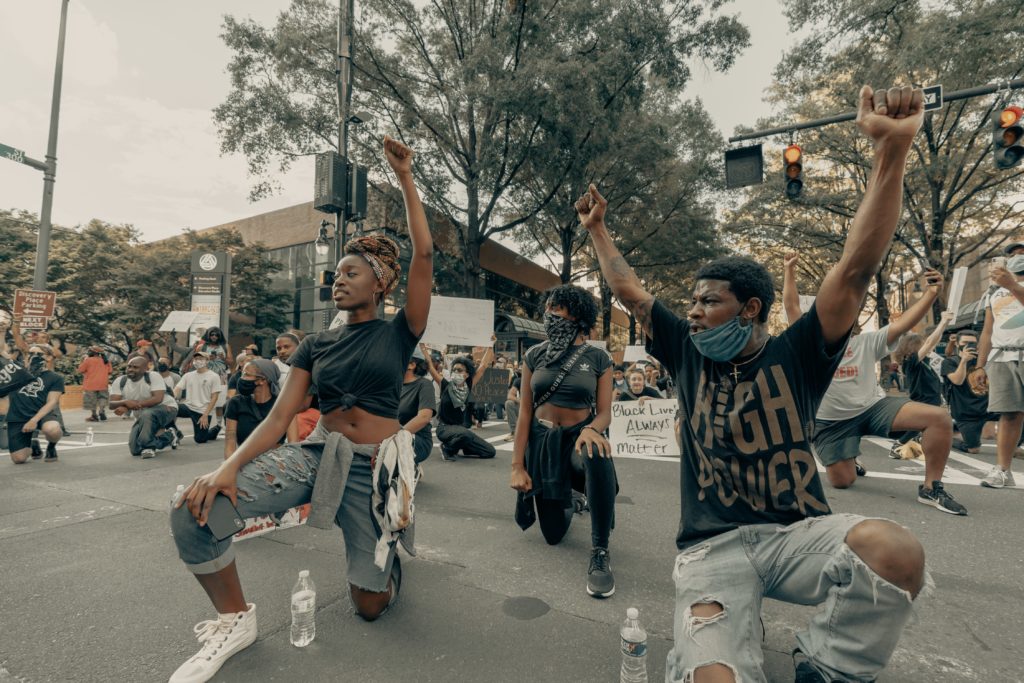By Nicholas Bailey, Birmingham Business School and Lloyds Banking Group Centre for Responsible Business, and Professor Nando Sigona, School of Social Policy
University of Birmingham
BLM became something very different from its previous incarnation on the day George Floyd died. It transitioned from social organisation to symbolising a societal ideal.
By any definition, 2020 has been a dramatic year. It was already the year of Australian bushfires, the impeachment of President Donald Trump, the conviction of Harvey Weinstein and the devastation of Coronavirus when, on May 25th, George Floyd uttered the phrase, “ I can’t breathe!”
Certain moments in history inspire the question: “Where were you when…?” The footage of George Floyd’s final moments was such a moment. Now, the mere mention of Floyd’s name summons up fragments of what we witnessed and the stirring of complex emotions. There was the moment when we all realised that, yet again, a Black man was in a life-threatening situation with law enforcement; yet again we witnessed the confusion of a Black person unable to prevent an unfolding escalation; and, with the statement: “I’m done,” there was moment when he succumbed to his inevitable demise.
The Black Lives Matter Movement did not begin on May 25th 2020. It was formed as a response to the verdict on the Trayvon Martin case in 2013. However, BLM became something very different from its previous incarnation on the day George Floyd died. It transitioned from social organisation to symbolising a societal ideal. It now exists in the collective heart not just the mind. It exists in the consciousness of many; whatever their background or creed. Marches, reminiscent of the Civil Rights marches of the 1960s took place, not just in the United States but throughout the world. Some marches took place in countries with miniscule Black populations. It must be said that we’d seen sizeable protests about important social and political issues before. What was different in summer 2020 was that Black Lives Matter became part of a collective global consciousness; a universal social statement. It spoke to many more of how to live and how not to live in human society and now seemed impossible not to process and relate to.

Black people marched with the full expression of their communities. White children marched alongside Asian adults; retired people marched alongside Undergraduates. All society became connected by a moral and ethical glue which spoke of how they wanted the world to improve; become better, kinder and more egalitarian. That is the difference and that is why the statement “no more” has a chance to catalyse an antidote to cynical and systemic racism. It now seems achievable, not just necessary.
We can discuss and postulate forever but what do we do now? How do we make and sustain positive change?
Firstly, we can each ask ourselves the personal, uncomfortable and critical questions. We need to be prepared to recognise that finding racism repugnant does not mean that it has not affected or benefitted us. We also need to get back to debate and this requires truly hearing and empathising with one another. We need an informed debate and this requires us to rethink what we teach in school about British and European history and the systemic nature of racism. We need to seek to understand each other in order to close the tangible or intangible gaps that exist between us. We need to somehow get beyond blame to purpose. We must work to collaborate and build solidarity and alliances. We should link and share. Organisations, institutions and entities that have research, resources and recommendations to share must do so.
With the US election approaching, President Trump and his team have shown no restraint in using the ‘race card’ to mobilise voters around events in Kenosha and Portland, diverting attention away from the devastation created by the many failings of the US administration in tackling the Covid-19 pandemic. The disproportionate impact of Covid-19 on Black Americans and ethnic minorities has put in sharp relief the racial injustice that still underpins American society and that leaves millions of Americans without healthcare coverage, many of whom belonging to the same ‘key worker’ category that has enabled our society to continue functioning during months of lockdown. Across the Atlantic, Covid-19 has exposed the deeply rooted racist structure of British and European societies; a reminder here and now that the practice of anti-racism starts here, in our cities, in our institutions, and in our backyards.
- More about Nicholas Bailey at the University of Birmingham
- More about Professor Nando Sigona at the University of Birmingham
- Back to Business School Blog
